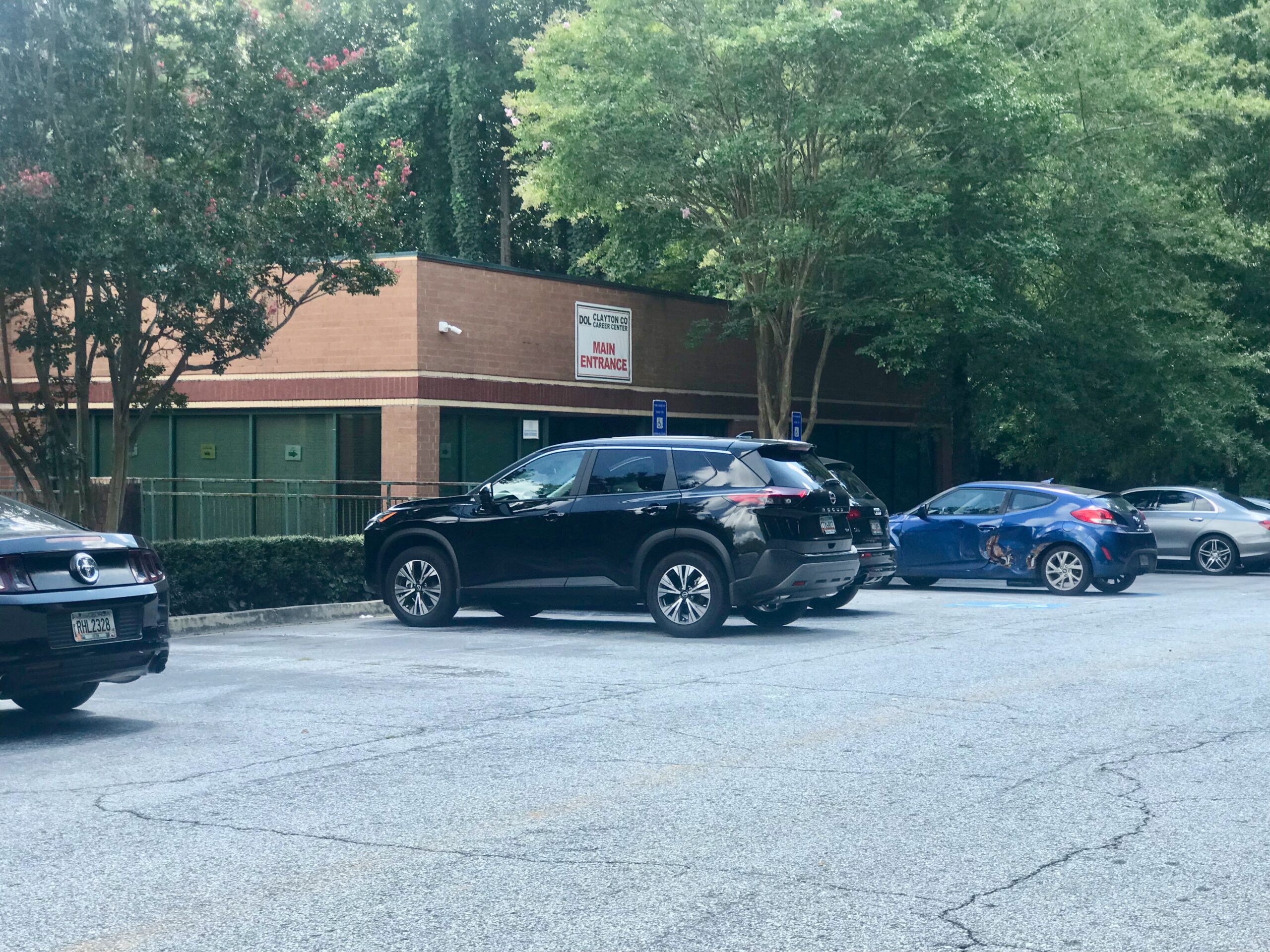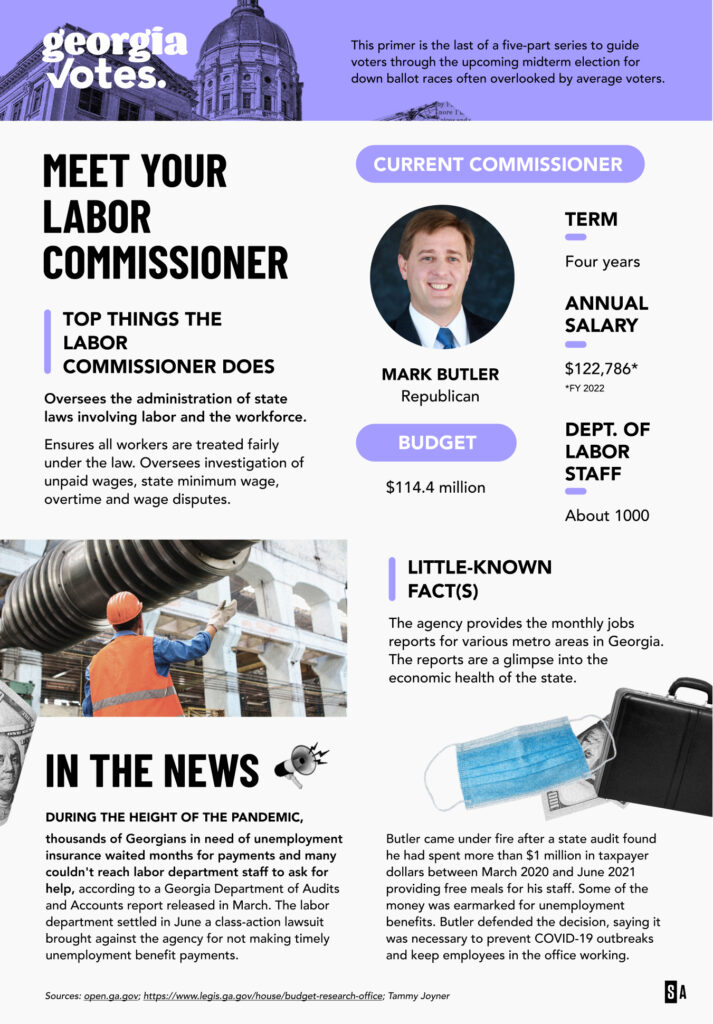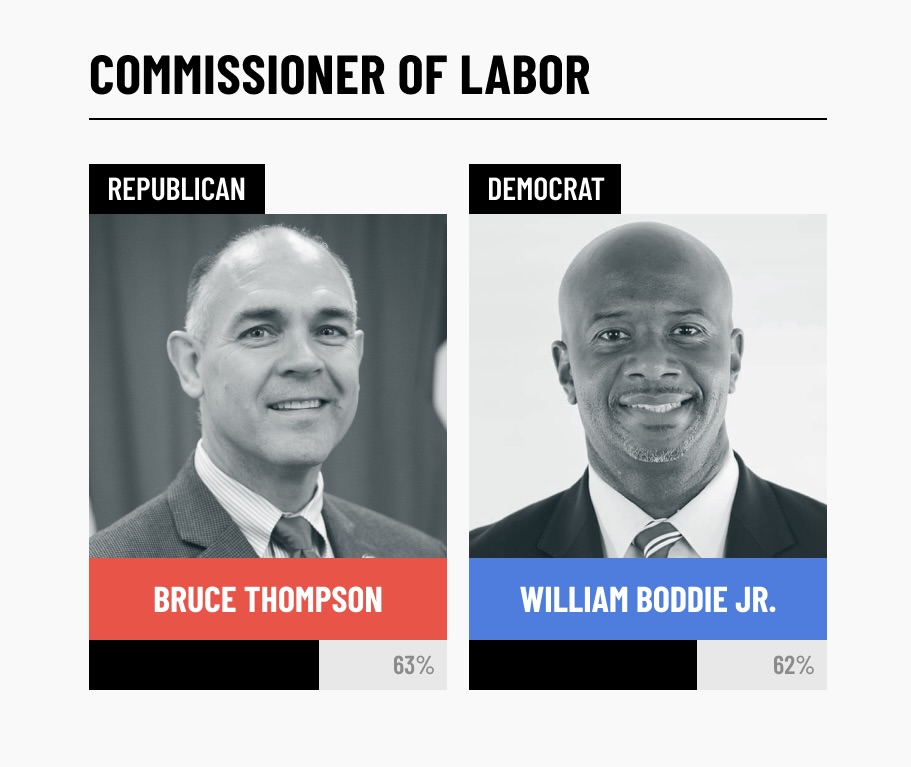Stay ahead of the curve as a political insider with deep policy analysis, daily briefings and policy-shaping tools.
Request a DemoMidterm Election of Labor Commissioner key in state’s post-pandemic recovery

Georgia Department of Labor Career Center in College Park, GA. (Credit: Tammy Joyner)
- Current labor commissioner not seeking re-election
- Department faces complaints for handling of unemployment benefits
- State now boasts low unemployment rate
Happy Labor Day!
This primer is the last of a five-part series to guide voters through the upcoming midterm election for Georgia agriculture, labor, insurance and public service commissioners as well as the superintendent of schools – down-ballot races often overlooked by average voters. This series examines how what happens in these offices impact you.

The Gist
This November voters will be asked to elect a labor commissioner to lead an agency that has come under fire for a barrage of complaints – including failing to expedite distribution of unemployment benefits during the pandemic.
But few voters know the extent of that role, how the Department of Labor impacts their everyday life and how some of the agency’s services have changed.
What’s Happening
Ask Jeff Humphreys and Anthony Tinch about their experience with the Georgia Department of Labor and you’ll get two vastly different views.
Humphreys is an economist who’s been relying on the state agency for more than three decades for relevant labor data to gauge Georgia’s economic health. It’s essential to his work as director of Economic Forecasting at the University of Georgia’s Terry College of Business.“[The labor market information] function has performed well over multiple decades,” Humphreys said.
But Tinch sees the department in an entirely different light.
The Jonesboro resident just wants the agency to give him the $365-a-week unemployment checks he’s owed due to his temporary seasonal layoff from Atlanta-based J & J Snacks, where he worked as a bakery mixer.
“I’ve got bills I have to pay and they’re not being helpful,” Tinch, a married father of one, said recently after leaving the Labor Department’s career center in College Park. He has been trying for nearly a month to get his benefits.

The responsibility for dispersing checks and labor data ultimately falls to state Labor Commissioner Mark Butler.
In addition to running the state unemployment insurance, the labor commissioner is responsible for administering Georgia’s labor regulations and, of course, producing statistics and research involving the Georgia labor market.
As of July 1, a significant share of the state labor department’s workforce solutions services has moved to the state’s Technical College System.
Butler, who after 12 years in office won’t be running for a fourth term in November, and his 1,000-member statewide staff have faced a slew of problems over the last couple of years.
The pandemic brought the global economy to a near standstill, creating a domino-effect for workers like Tinch caught in an overwhelmed safety net.
Chief among the complaints: The department was slow in responding to calls and processing claims. A state audit released in March found “call volume increased significantly during the pandemic; however only 4 percent of calls were answered.” Butler’s response? The department didn’t get enough money to handle the record volume of claims from Georgians left jobless due to the pandemic.

Georgia’s labor department is funded through a combination of federal and state dollars, with the lion’s share coming from the federal government. At the state level, the department historically has been underfunded, according to the Georgia Budget & Policy Institute. That issue became a stark concern during the Pandemic.
Billions of dollars in jobless claims have been disbursed to millions of Georgians since March 2020 when the pandemic officially began, experts said.
The department’s problematic processing and dispersal of claims led to the Southern Poverty Law Center suing the labor department last year. Both sides have reached a settlement focusing on improving internal systems.
Meanwhile, the number of first-time jobless claims in Georgia has dropped by more than half – 51.5% – in the last year.
That’s little comfort to Tinch and the thousands of others waiting on the benefit now.
“By the time I get a check, I’ll be back to work,” said Tinch last week, noting that he completed the necessary paperwork from his employer and stopped by its College Park office where he was told to go back online to the Labor Department website to process his claims.
Tinch’s aggravation comes as the Peach State is enjoying its lowest unemployment rate ever. The unemployment rate in July – the latest available data – was 2.8%. At the same time, the state saw record job growth. The number of jobs grew more than 12,000 between June and July.
The state’s unemployment rate has dropped by more than half in the last two years. The unemployment rate for the same month in 2020 and 2021 was 7.7% and 3.9%, respectively.
The current unemployment rate means Georgia is essentially at full employment, said Humphreys. “There’s two jobs for every available worker,” he added.
While that’s good news on this Labor Day, Georgians have a big job on November 8 in deciding who will be Butler’s successor.
Why It Matters
Agency complaints and chaos aside, Humphreys said the labor commissioner’s job goes beyond dispensing data to analysts and unemployment checks to the jobless – the tasks most recognized.
“That’s probably the least important function. To me, the most important function is the information [the agency] provides that helps people choose careers that are less likely to suffer unemployment and that are more likely to provide higher lifetime earnings. That labor market information is the most valuable function performed by the Department of Labor,” said Humphreys.
For the general public, the Georgia Labor Department offers a host of training programs and career and job search assistance.
“It’s very valuable information for somebody who is just starting out, whether they’re in high school or trying to choose a major for college or trying to decide whether to go to a technical school,” Humphreys said. “It’s also a good resource for somebody later in their career that needs to make a change. This information is available to the public.”
What’s Next?
Tinch intends to vote in the November midterms. For now though, he has some advice for Butler’s successor. Three people are vying for the job: State Rep. William Boddie Jr. (D-East Point) represents District 62. Sen. Bruce Thompson (R-White) represents District 14 in the State Senate. Emily Anderson, a libertarian, also is running.
“When you’re dealing with people in the community – and you want the community behind you – you’ve got to support the community with full resources and access to the things they need,” he said. “These people are workers, and we’re in [the center] being treated like we’re bothering them.”

Join the Conversation
What else do you want to know about the Department of Labor, voting or elections in Georgia? Share your thoughts/tips by emailing [email protected] or on Twitter @LVJOYNER
Read State Affairs’ Georgia Votes 2022 series.
Part I: PUBLIC SERVICE COMMISSIONERS: KEEPING THE LIGHTS ON
Part II: DEPARTMENT OF AGRICULTURE: WHERE POULTRY, PIE, PUMP AND PUPPY MEET
Part III: STATE SCHOOL SUPERINTENDENT: EDUCATING OUR COUNTRY’S FUTURE
Part IV: Ups and downs of the Insurance and Safety Fire Commissioner
Header photo: Georgia Department of Labor Career Center in College Park, GA. (Credit: Tammy Joyner)
Newly minted Senate Minority Leader Harold Jones II: ‘I’m not the typical back-slapping politician’
Nearly 10 years into legislative life, Sen. Harold Jones II wouldn’t change anything about the experience. “I love every minute of it. Even when I hate it, I love it,” the 55-year-old Augusta Democrat told State Affairs. Come January, Jones will add another role to his legislative duties: Senate minority leader, a job held for …
Gov. Kemp calls on state agencies to be fiscally restrained amid record $16.5B surplus
The Gist Gov. Brian Kemp asked the state’s 51 government agencies for continued fiscal restraint when drafting their amended fiscal year 2025 and 2026 budgets. Most agencies adhered to his request even as the state’s general fund surplus hit a record $16.5 billion last month. Forty-five agencies, excluding state courts, followed the governor’s instructions to …
Georgia defies bomb threats as election chief declares a “free, fair and fast” vote amid record turnout
ATLANTA – Despite dealing with over 60 bomb threats, Georgia’s election chief said Tuesday the state’s general election went smoothly. Georgia had a record turnout with nearly 5.3 million people voting, Secretary of State Brad Raffensperger told reporters. Election officials in the state’s 159 counties have until 5 p.m. to certify votes. “We had a …
In the (state)house: Meet the newest members of the Georgia legislature
When lawmakers reconvene at the state Capitol on Jan. 13, there’ll be a cadre of new faces in the 236-member Georgia General Assembly, one of the nation’s largest state legislatures. All 236 statehouse seats were up for election this year. Most candidates ran unopposed. Incumbents in contested races easily kept their seats, with the exception …




